Permit Freedom: Reducing Regulation in Everyday Life
Authored by Aerin Christensen, Policy Analyst, Local Government
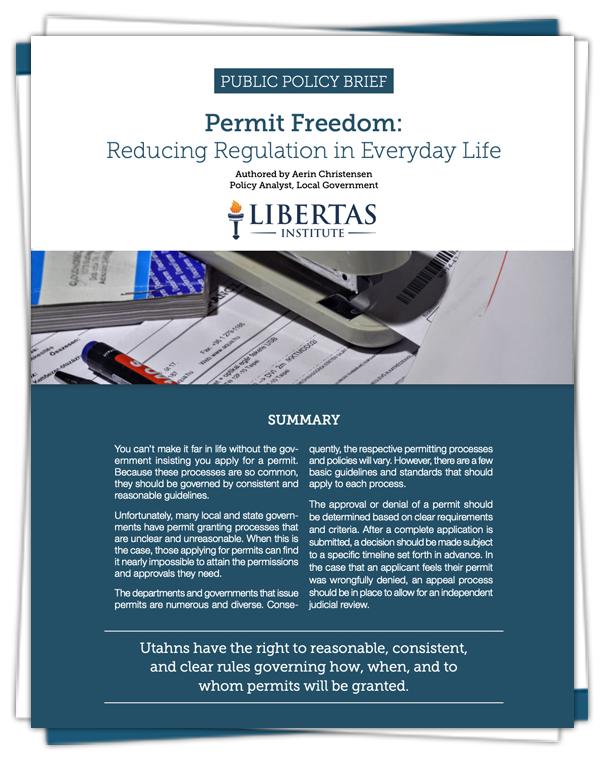 You can’t make it far in life without the government insisting you apply for a permit. Because these processes are so common, they should be governed by consistent and reasonable guidelines.
You can’t make it far in life without the government insisting you apply for a permit. Because these processes are so common, they should be governed by consistent and reasonable guidelines.
Unfortunately, many local and state governments have permit granting processes that are unclear and unreasonable. When this is the case, those applying for permits can find it nearly impossible to attain the permissions and approvals they need.
The departments and governments that issue permits are numerous and diverse. Consequently, the respective permitting processes and policies will vary. However, there are a few basic guidelines and standards that should apply to each process.
The approval or denial of a permit should be determined based on clear requirements and criteria. After a complete application is submitted, a decision should be made subject to a specific timeline set forth in advance. In the case that an applicant feels their permit was wrongfully denied, an appeal process should be in place to allow for an independent judicial review.
Read the briefProtecting the Right to Privacy in a Digital Era
Authored by James Czerniawski, Policy Analyst, Tech and Innovation
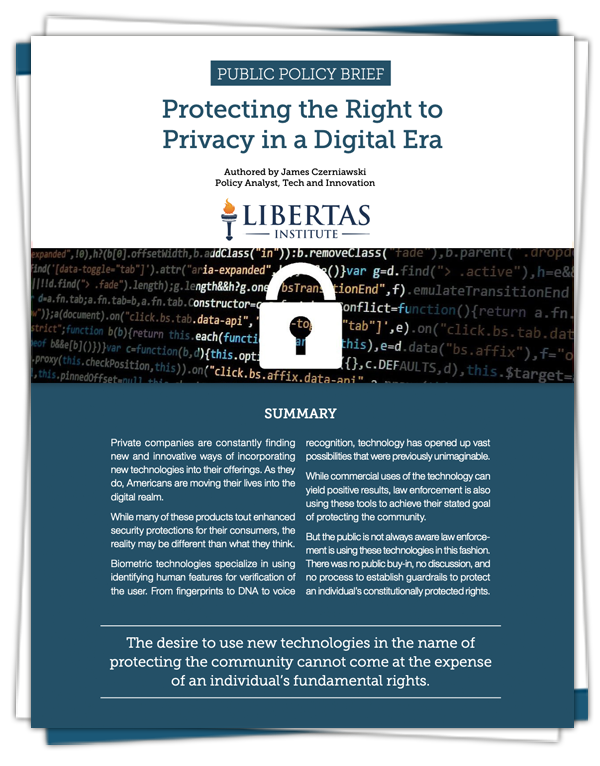 Private companies are constantly finding new and innovative ways of incorporating new technologies into their offerings. As they do, Americans are moving their lives into the digital realm.
Private companies are constantly finding new and innovative ways of incorporating new technologies into their offerings. As they do, Americans are moving their lives into the digital realm.
While many of these products tout enhanced security protections for their consumers, the reality may be different than what they think.
Biometric technologies specialize in using identifying human features for verification of the user. From fingerprints to DNA to voice recognition, technology has opened up vast possibilities that were previously unimaginable.
While commercial uses of the technology can yield positive results, law enforcement is also using these tools to achieve their stated goal of protecting the community.
But the public is not always aware law enforcement is using these technologies in this fashion. There was no public buy-in, no discussion, and no process to establish guardrails to protect an individual’s constitutionally protected rights.
Read the briefProtecting Your DNA From Government Fishing Expeditions
Authored by Michael Melendez, Director of Policy
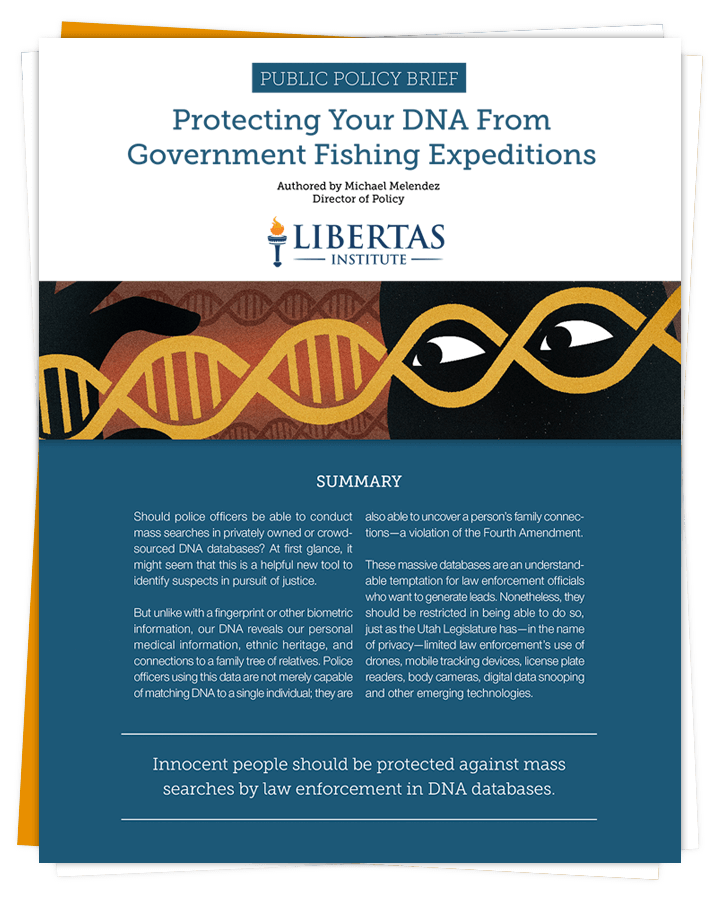 Should police officers be able to conduct mass searches in privately owned or crowd-sourced DNA databases? At first glance, it might seem that this is a helpful new tool to identify suspects in pursuit of justice.
Should police officers be able to conduct mass searches in privately owned or crowd-sourced DNA databases? At first glance, it might seem that this is a helpful new tool to identify suspects in pursuit of justice.
But unlike with a fingerprint or other biometric information, our DNA reveals our personal medical information, ethnic heritage, and connections to a family tree of relatives. Police officers using this data are not merely capable of matching DNA to a single individual; they are also able to uncover a person’s family connections—a violation of the Fourth Amendment.
These massive databases are an understandable temptation for law enforcement officials who want to generate leads. Nonetheless, they should be restricted in being able to do so, just as the Utah Legislature has—in the name of privacy—limited law enforcement’s use of drones, mobile tracking devices, license plate readers, body cameras, digital data snooping and other emerging technologies.
Read the briefUtah Innovates: Regulatory Frameworks for the Future
Authored by James Czerniawski, Tech and Innovation Policy Analyst
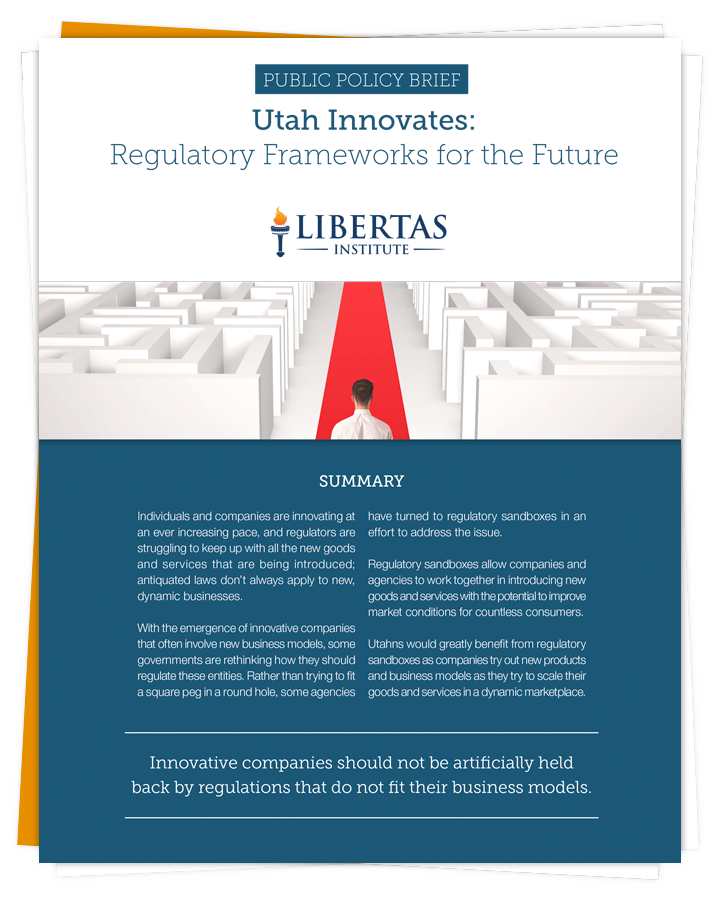 Individuals and companies are innovating at an ever increasing pace, and regulators are struggling to keep up with all the new goods and services that are being introduced; antiquated laws don’t always apply to new, dynamic businesses.
Individuals and companies are innovating at an ever increasing pace, and regulators are struggling to keep up with all the new goods and services that are being introduced; antiquated laws don’t always apply to new, dynamic businesses.
With the emergence of innovative companies that often involve new business models, some governments are rethinking how they should regulate these entities. Rather than trying to fit a square peg in a round hole, some agencies have turned to regulatory sandboxes in an effort to address the issue.
Regulatory sandboxes allow companies and agencies to work together in introducing new goods and services with the potential to improve market conditions for countless consumers.
Utahns would greatly benefit from regulatory sandboxes as companies try out new products and business models as they try to scale their goods and services in a dynamic marketplace.
Read the briefGovernment Accountability for Causing Individuals Harm
Authored by Molly Davis, Policy Analyst, Criminal Justice Policy Analyst
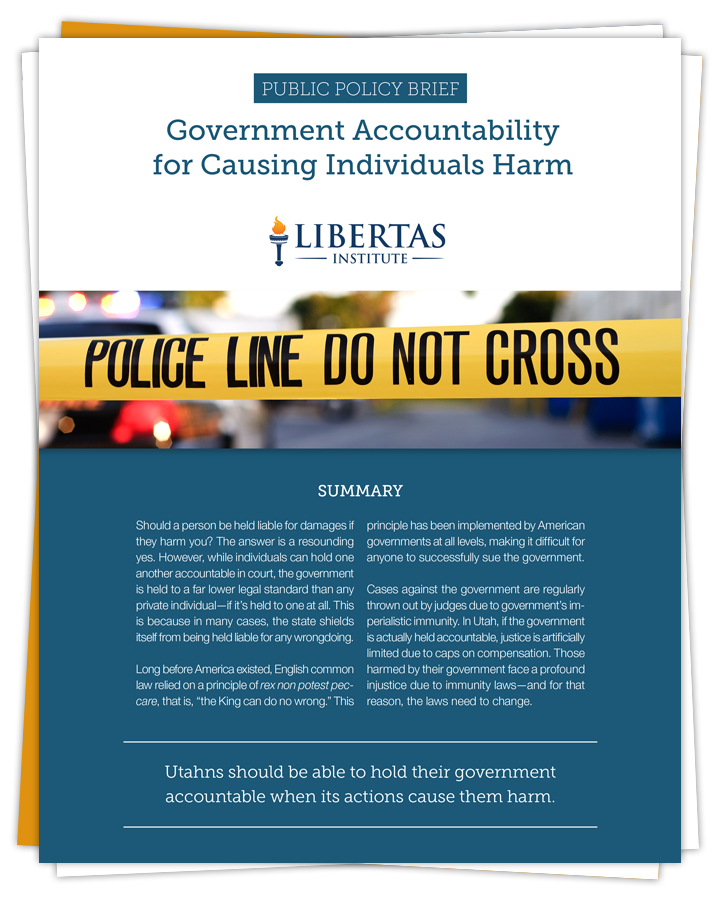 Should a person be held liable for damages if they harm you? The answer is a resounding yes. However, while individuals can hold one another accountable in court, the government is held to a far lower legal standard than any private individual—if it’s held to one at all. This is because in many cases, the state shields itself from being held liable for any wrongdoing.
Should a person be held liable for damages if they harm you? The answer is a resounding yes. However, while individuals can hold one another accountable in court, the government is held to a far lower legal standard than any private individual—if it’s held to one at all. This is because in many cases, the state shields itself from being held liable for any wrongdoing.
Long before America existed, English common law relied on a principle of rex non potest peccare, that is, “the King can do no wrong.” This principle has been implemented by American governments at all levels, making it difficult for anyone to successfully sue the government.
Cases against the government are regularly thrown out by judges due to government’s imperialistic immunity. In Utah, if the government is actually held accountable, justice is artificially limited due to caps on compensation. Those harmed by their government face a profound injustice due to immunity laws—and for that reason, the laws need to change.
Read the briefProtecting Your Digital Data from Warrantless Searches
Authored by Michael Melendez, Director of Policy
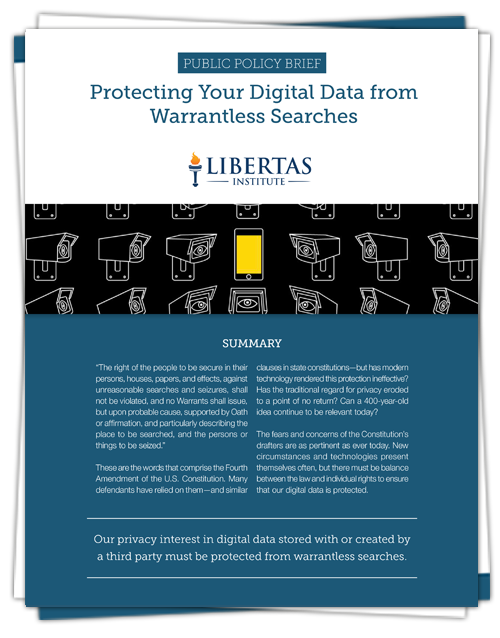 “The right of the people to be secure in their persons, houses, papers, and effects, against unreasonable searches and seizures, shall not be violated, and no Warrants shall issue, but upon probable cause, supported by Oath or affirmation, and particularly describing the place to be searched, and the persons or things to be seized.”
“The right of the people to be secure in their persons, houses, papers, and effects, against unreasonable searches and seizures, shall not be violated, and no Warrants shall issue, but upon probable cause, supported by Oath or affirmation, and particularly describing the place to be searched, and the persons or things to be seized.”
These are the words that comprise the Fourth Amendment of the U.S. Constitution. Many defendants have relied on them—and similar clauses in state constitutions—but has modern technology rendered this protection ineffective? Has the traditional regard for privacy eroded to a point of no return? Can a 400-year-old idea continue to be relevant today?
The fears and concerns of the Constitution’s drafters are as pertinent as ever today. New circumstances and technologies present themselves often, but there must be balance between the law and individual rights to ensure that our digital data is protected.
Read the brief